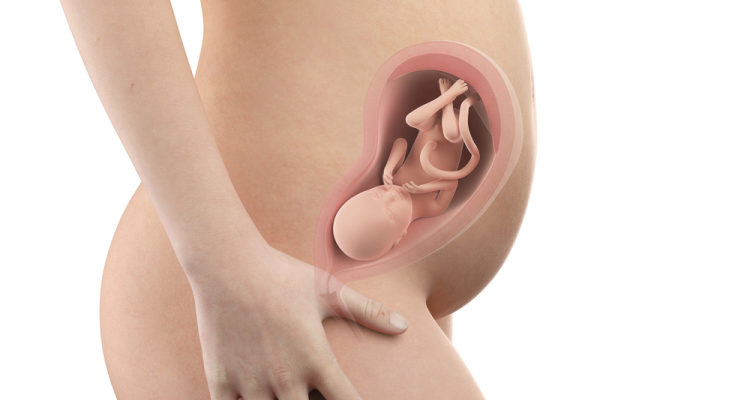
Main content:
28-week fetus development
Maternal body changes at 28 weeks of pregnancy
Doctor's advice about 28 week pregnancy
Maternal and fetal health at 28 weeks
28-week fetus development
How does a 28-week fetus develop?
Baby is now the size of a large eggplant, weighing about 1kg and nearly 38 cm long from head to heel.
At your next antenatal visit at 28 weeks of age, your doctor can tell you if your baby is in front or front legs or buttocks (called birthing position) in the uterus. . Babies in the reverse position may need a cesarean section . Your baby still has 2 months to change positions, so don't worry if your baby is in the reverse birthing position right now. Most babies will switch positions on their own.
At this time, the baby's brain's folds and furrows continue to develop and expand. In addition, the baby's skin continues to have an extra layer of fat and is continuing to grow hair.
Maternal body changes at 28 weeks of pregnancy
28 weeks pregnant, how does mother's body change?
Your doctor may give you a blood test early in 28 weeks. One factor blood tests look for is Rh - a substance found in the red blood cells of most people. If the mother does not have Rh (if she is Rh negative) but the baby is Rh positive, there is a chance that the baby will have health problems, such as jaundice and anemia. Your doctor can prevent these problems by giving you an injection of Rh globulin immunity at 28 weeks of pregnancy and after birth.
What are the things you need to pay attention to?
You will start to have symptoms of swelling from 26 weeks. To reduce swelling, here are some tips:
Give your legs and butt a break
Raise her legs while mom is sitting
Take a break from time to time by lying on your side
Wear comfortable clothes
Maintain an exercise routine
Drink a lot of water. Although it may seem counterintuitive, it's true: The more water I drink, the less water I will keep.
Wearing supportive socks may not be sexy, but they are very effective at reducing swelling.
Doctor's advice about 28 week pregnancy
What should mom discuss with the doctor?
At 28 weeks of pregnancy, if your mother's swelling becomes worse than before, talk to your doctor and seek treatment. Excessive swelling can be a sign of pre-eclampsia , but that's when it is accompanied by a host of other symptoms such as sudden excessive and unexplained weight gain, high blood pressure and protein in the urine. . If the mother's blood pressure and urine are normal (they are usually checked every prenatal visit), there's nothing to worry about.
Be aware when swelling is accompanied by other signs such as: you have had unusual and unexplained weight gain for a short time, or if you have a severe headache or vision disorder. Call your doctor to determine exactly what the problem is with you so that you can best ensure your health and fetal development .
What tests do you need to know?
A few new tests will be done during this month's wellness checkup and will be compared with the old metrics. In the last trimester of pregnancy, you can expect your doctor to perform the following tests, although there may be a difference depending on your specific needs and the doctor's way:
Measure your weight and blood pressure
Urine test to measure sugar and protein
Check the fetal heart rate
Measure the size of the uterus by touching the outside (feel it from the outside) to see how it correlates to the due date.
Height of the fundus (top of the uterus)
Varicose veins of the legs, swelling of the hands and feet
The test checks the amount of glucose
Blood test for anemia
Diphtheria vaccine
Symptoms the mother experienced, especially unusual symptoms
Make a ready list of questions or problems you want to discuss with your doctor.
Maternal and fetal health at 28 weeks
What do you need to know to ensure safety during pregnancy?
1. Injecting botox
When the fetus is 28 weeks old, if you think about getting Botox but are afraid that it could harm the baby, you should know that using botox in pregnant women has not been studied for safety. If the mother has ever used botox and found herself pregnant, this is unlikely to pose any risk to the baby. Studies have shown that when the botox is injected into the facial muscle, a small amount of the dose does not circulate in the mother's body. So it won't harm the baby. Because there is no specific evidence that botox injections do not harm the fetus, mothers should only use this method when the baby is safely born.
2. Wear high heels
Wearing high heels (even soles) is not a good idea during pregnancy. Especially during the 28-week-old fetus period, the mother's weight will increase with the change in body shape and body focus, which will make the mother have a different gait and less stable. In addition, the mother's ligaments tend to loosen during pregnancy, which can lead to general instability and muscle tension.
Falling during pregnancy can hurt mother and baby, so think twice before wearing high heels . If you decide to wear heels, consider the height of your shoes according to the pregnancy progression and remember to put comfort and safety above being trendy.












